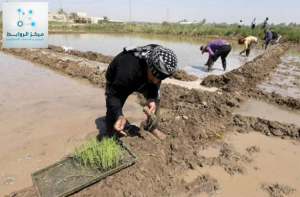BY: Shatha kalel
Iraq, once known as the “Land of Two Rivers,” is facing an alarming agricultural decline. Over the past ten years, the country has witnessed a staggering 62% reduction in lands cultivated with river water. This drastic decrease is not just a statistic; it represents a significant threat to Iraq’s food security, economic stability, and rural livelihoods. In this article, we will explore the reasons behind this decline and analyze its broader implications for the country.
The Decline in River-Irrigated Agriculture
Iraq’s rivers, the Tigris and the Euphrates, have historically been the lifeblood of its agriculture. These rivers provided the water necessary to irrigate vast expanses of fertile land, supporting the growth of wheat, barley, rice, and other essential crops. However, over the last decade, the area of land irrigated by these rivers has shrunk by more than half. Several factors contribute to this decline:
Climate Change: Iraq is experiencing hotter and drier conditions, with temperatures rising and rainfall patterns becoming increasingly erratic. This has led to reduced river flows and a diminished capacity to support irrigation.
Upstream Dams and Water Management: Neighboring countries, particularly Turkey and Iran, have constructed dams and diverted water from the Tigris and Euphrates rivers for their own agricultural and energy needs. This has significantly reduced the amount of water flowing into Iraq, exacerbating the water shortage.
Poor Water Management: Iraq’s aging irrigation infrastructure and inefficient water management practices have further compounded the problem. Many irrigation systems are outdated, leading to significant water losses through leakage and evaporation.
Soil Degradation: Decades of overuse, salinization, and neglect have degraded the quality of Iraq’s agricultural soils. As a result, even when water is available, the land is less productive.
Analysis: The Broader Implications for Iraq
The decline in river-irrigated agriculture has far-reaching consequences for Iraq. Here are some key areas of concern:
Food Security: With less land available for cultivation, Iraq’s ability to produce enough food to meet the needs of its population is severely compromised. The country has become increasingly reliant on food imports, making it vulnerable to global market fluctuations and price shocks.
Economic Impact: Agriculture is a vital part of Iraq’s economy, providing employment for a significant portion of the population. The decline in irrigated agriculture has led to job losses, increased rural poverty, and a migration of people from rural areas to urban centers in search of work.
Social Stability: The loss of agricultural livelihoods and the resulting economic hardships are contributing to social unrest. As people struggle to make ends meet, tensions are rising, particularly in rural areas where communities are most affected by the decline in agriculture.
Environmental Degradation: The reduction in cultivated land is also leading to environmental degradation. Desertification is spreading, and the loss of vegetation is contributing to the further deterioration of the land. This creates a vicious cycle, where degraded land is less capable of supporting agriculture, leading to even more land being abandoned.
The Way Forward
To address this crisis, Iraq must take immediate and strategic action. The government needs to invest in modernizing its irrigation infrastructure and implementing more efficient water management practices. This could involve the adoption of drip irrigation systems, which use less water and reduce evaporation losses.
Additionally, Iraq should engage in regional diplomacy to secure more equitable water-sharing agreements with upstream countries. International cooperation and support will be essential in this effort, as the water resources of the Tigris and Euphrates are transboundary issues that require collaborative solutions.
Finally, investing in soil restoration and sustainable farming practices can help rehabilitate degraded lands and make them productive again. This will not only improve food security but also create jobs and support rural communities.
Conclusion
The 62% decline in lands cultivated with river water over the past decade is a clear indicator of the growing water crisis in Iraq. This decline poses a serious threat to the country’s food security, economic stability, and social cohesion. However, with concerted efforts in water management, international cooperation, and sustainable agriculture, Iraq can begin to reverse this trend and build a more resilient agricultural sector for the future. The time for action is now, as the stakes for Iraq’s future could not be higher.

